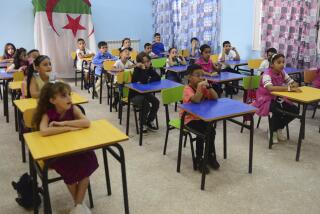Arabs Aim New War Against Old Foe--Illiteracy
- Share via
MANAMA, Bahrain — The oil-producing states around the Persian Gulf have embarked on a campaign to conquer an old enemy--illiteracy.
Caravans are moving across the Arabian Peninsula, taking teachers and literacy classes to nomadic Bedouins. Free bus service and government-run child-care centers are enabling 10,000 illiterate Bahraini adults to attend reading-and-writing programs.
Cash rewards are being offered throughout the region for those who move into the ranks of the functionally literate.
Bahrain says that every student studying abroad must teach at least one relative to read and write while he is home for summer vacation. If successful, the student will receive the equivalent of $530.
Kuwait offers $180 to adults who achieve an acceptable level of literacy. The Saudis, who also offer cash rewards, have set up 3,200 reading centers, and adult attendance has reached nearly 150,000.
“This ministry is the path to the future,” said Bahrain’s minister of education, Ali Fakhro, expressing a common sentiment in the gulf. “If we fail here, then all the oil in the world won’t mean a thing.”
The literacy rate varies widely in the region, ranging from 40% in Bahrain, the first country to institute formal education, to 52% in Saudi Arabia, according to CIA figures. Education experts say the rate is only 30% for Arab women, for generations barred from school on religious grounds.
Most Arabs do not read for pleasure, but the spoken Arab word has had great impact since pre-Islamic times. Poetry festivals at the Okaz marketplace near Mecca, the holy city in Saudi Arabia, attracted thousands of spectators as far back as 1,400 years ago, and history books tell of tribal wars in the peninsula being suspended so the warriors could compete in gatherings of poetry reading.
About 86% of Bahrain’s children are now in school, though attendance is not mandatory in this island nation of 409,000 people. The high level of voluntary attendance underscores the fact that education has become an accepted step in life for these countries that have been propelled so rapidly into the 20th Century.
“Our goal is to wipe out illiteracy entirely by the year 2000,” said Mohammed Bas, who runs Bahrain’s campaign. “Whether we succeed depends on whether the illiterate people realize they are losing a lot--economically and otherwise--by not being able to read and write.”
More to Read
Sign up for Essential California
The most important California stories and recommendations in your inbox every morning.
You may occasionally receive promotional content from the Los Angeles Times.













